外研版(2019)必修第一册_Unit3Family matters Using language 时态合集课件(38张ppt)
文档属性
| 名称 | 外研版(2019)必修第一册_Unit3Family matters Using language 时态合集课件(38张ppt) | 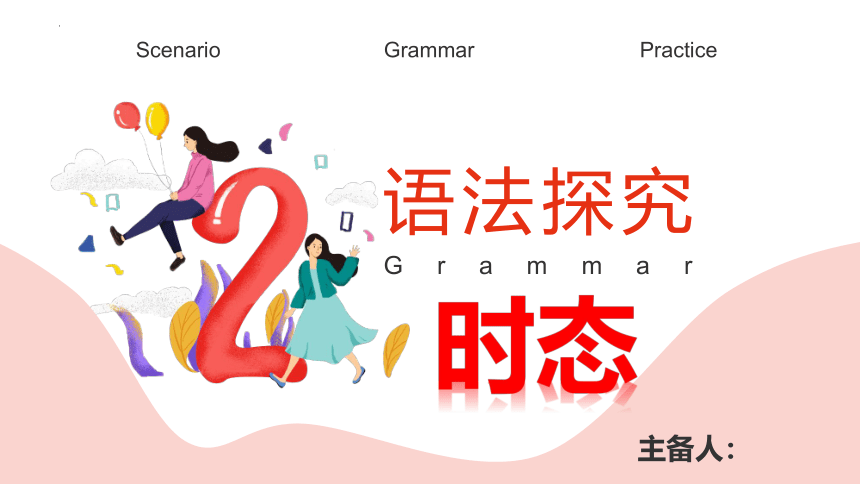 | |
| 格式 | pptx | ||
| 文件大小 | 5.0MB | ||
| 资源类型 | 教案 | ||
| 版本资源 | 外研版(2019) | ||
| 科目 | 英语 | ||
| 更新时间 | 2022-11-18 20:31:34 | ||
图片预览

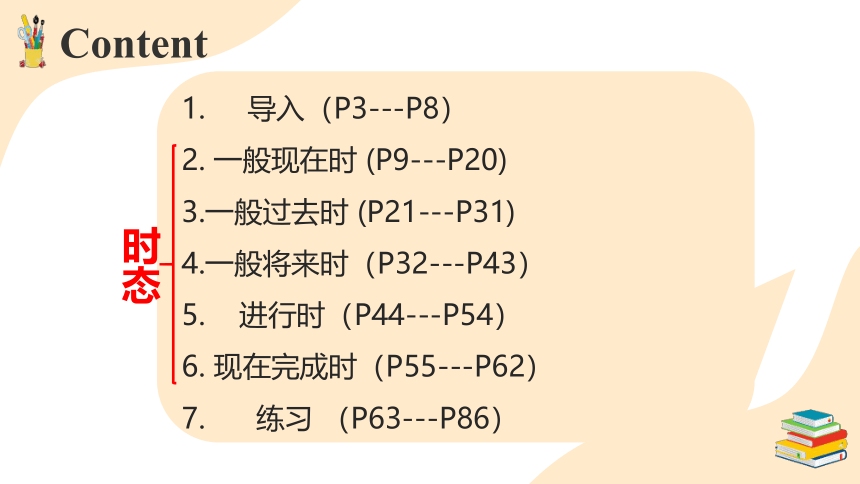
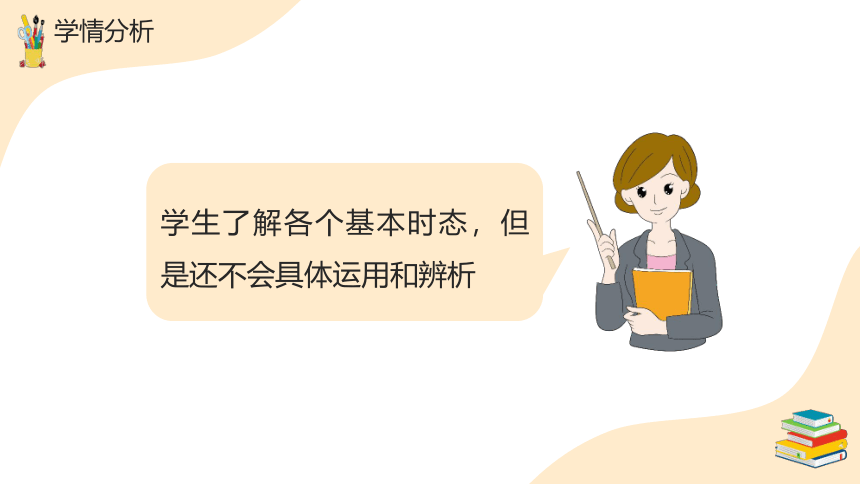
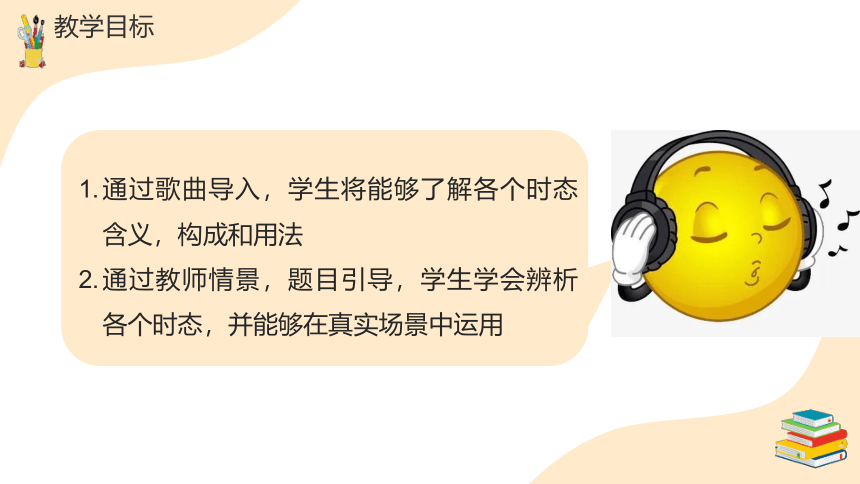
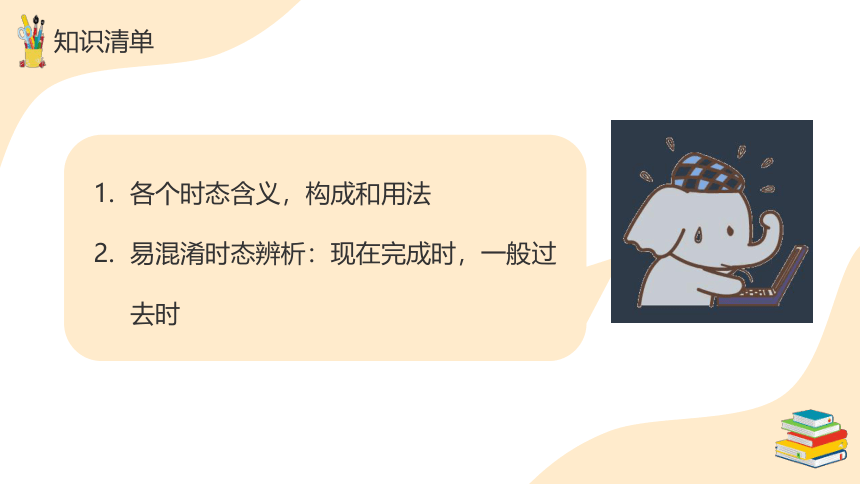
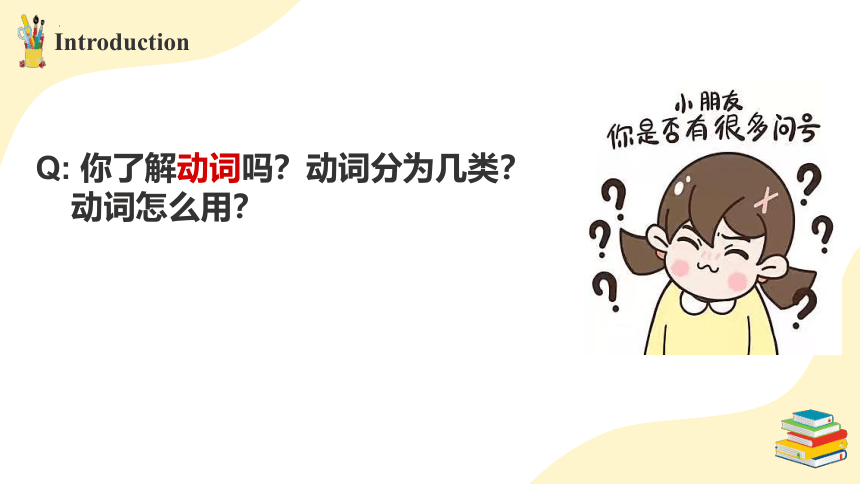
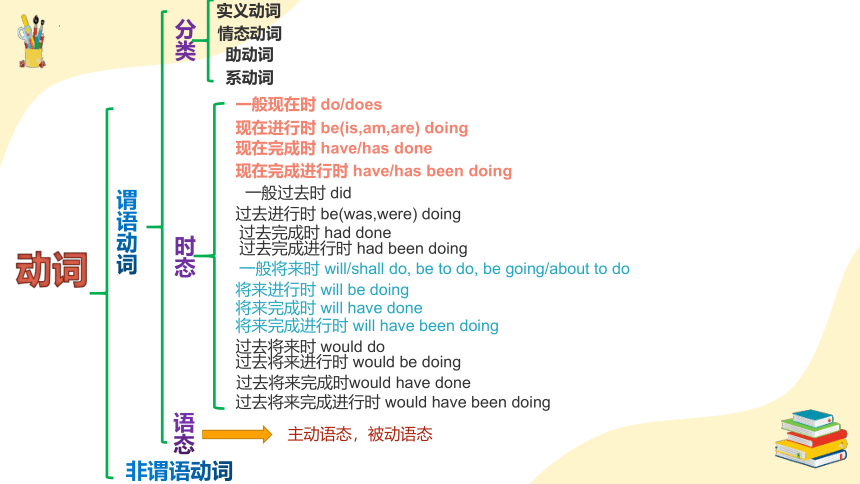
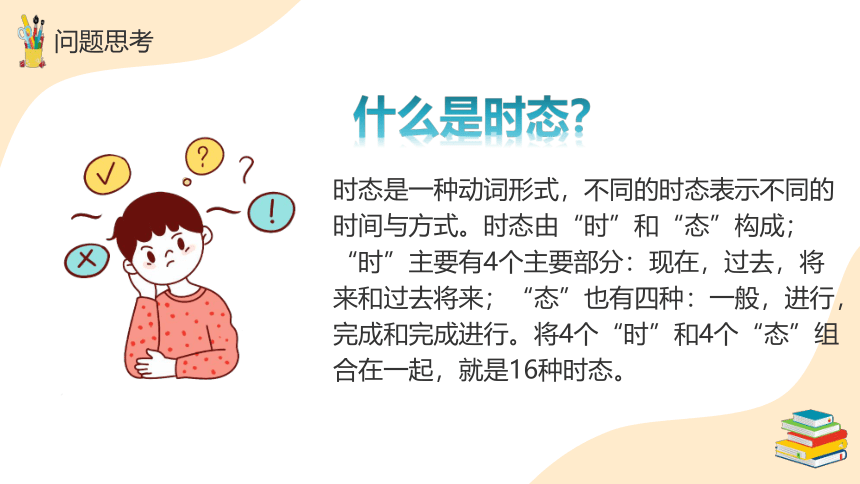
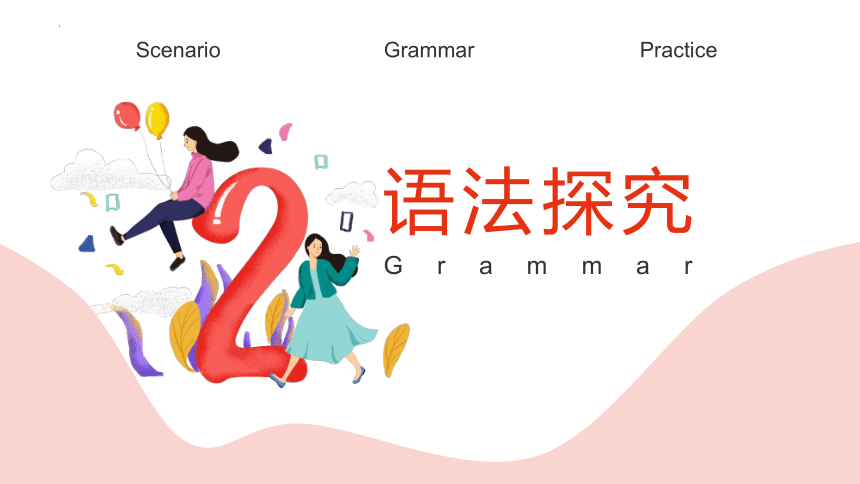
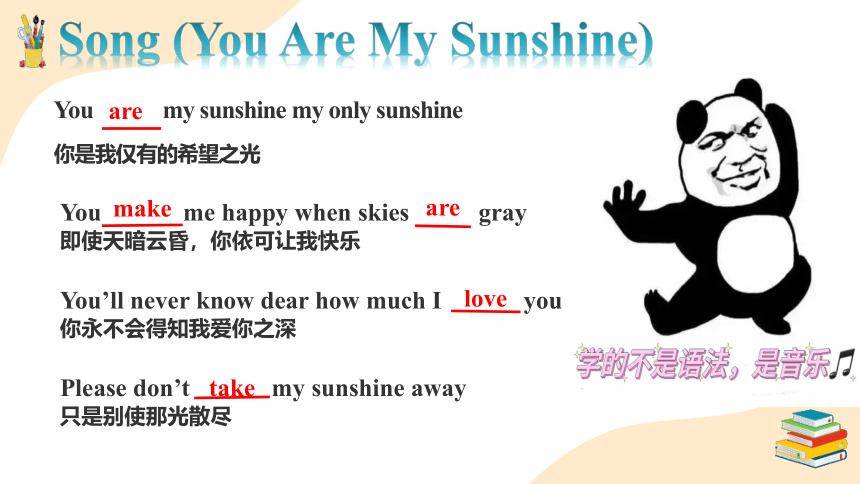

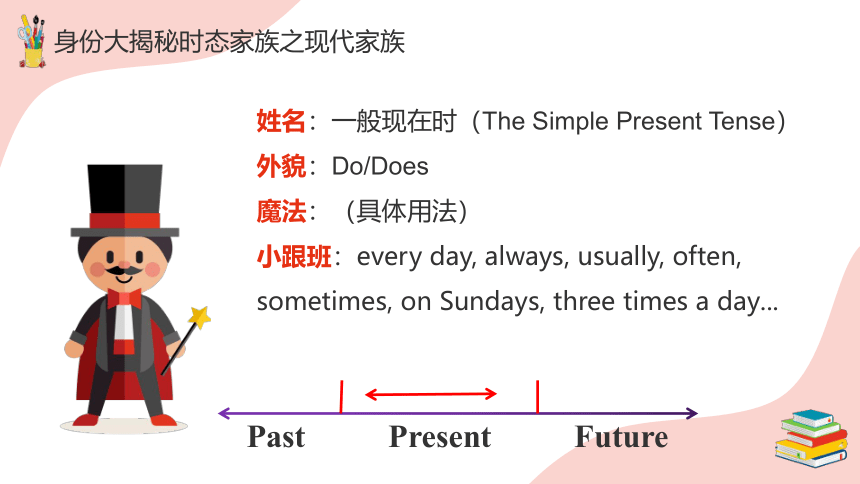
文档简介
(共86张PPT)
时态
主备人:
Content
1. 导入(P3---P8)
2. 一般现在时 (P9---P20)
3.一般过去时 (P21---P31)
4.一般将来时(P32---P43)
5. 进行时(P44---P54)
6. 现在完成时(P55---P62)
7. 练习 (P63---P86)
时态
学情分析
学生了解各个基本时态,但是还不会具体运用和辨析
教学目标
通过歌曲导入,学生将能够了解各个时态含义,构成和用法
通过教师情景,题目引导,学生学会辨析各个时态,并能够在真实场景中运用
知识清单
各个时态含义,构成和用法
易混淆时态辨析:现在完成时,一般过去时
Introduction
Q: 你了解动词吗?动词分为几类?
动词怎么用?
动词
谓语动词
分类
实义动词
情态动词
助动词
系动词
时态
一般现在时 do/does
现在进行时 be(is,am,are) doing
现在完成时 have/has done
现在完成进行时 have/has been doing
一般过去时 did
过去进行时 be(was,were) doing
过去完成时 had done
过去完成进行时 had been doing
一般将来时 will/shall do, be to do, be going/about to do
将来进行时 will be doing
将来完成时 will have done
将来完成进行时 will have been doing
过去将来时 would do
过去将来进行时 would be doing
过去将来完成时would have done
过去将来完成进行时 would have been doing
语态
主动语态,被动语态
非谓语动词
问题思考
什么是时态?
时态是一种动词形式,不同的时态表示不同的时间与方式。时态由“时”和“态”构成;“时”主要有4个主要部分:现在,过去,将来和过去将来;“态”也有四种:一般,进行,完成和完成进行。将4个“时”和4个“态”组合在一起,就是16种时态。
Song (You Are My Sunshine)
You my sunshine my only sunshine
你是我仅有的希望之光
are
You me happy when skies gray
即使天暗云昏,你依可让我快乐
make
are
You’ll never know dear how much I you
你永不会得知我爱你之深
love
Please don’t my sunshine away
只是别使那光散尽
take
探索发现
...
Q:你知道空格里的动词体现的是什么时态吗?
身份大揭秘时态家族之现代家族
姓名:一般现在时(The Simple Present Tense)
外貌:Do/Does
魔法:(具体用法)
小跟班:every day, always, usually, often, sometimes, on Sundays, three times a day...
Past
Present
Future
一般现在时(The Simple Present Tense)
用法1:
表示经常发生的、习惯性的、反复出现的动作或状态。常与表示习惯的副词(词组)always, usually, often, sometimes, occasionally, seldom, never, every time/day/night, now and then连用
他每天都去上学。
1. He goes to school every day.(经常性动作)
他很高兴。
2. He is very happy.(现在的状态)
一般现在时(The Simple Present Tense)
用法2:
表示客观事实、真理、格言或者警句等。
地球绕着太阳转。
1. The earth moves around the sun.
有志者,事竟成。
2. Where there is a will, there is a way.
失败乃成功之母。
3. Failure is the mother of success.
一般现在时(The Simple Present Tense)
用法3:
表示按照时间表、计划安排好的或者规定的行为,只限于come,go, arrive,leave, start, begin, stop, close, stay,return等表示动作趋向性或移动意义的词。
火车早上九点开。
1. The train starts at nine in the morning.
小卖铺每天晚上11点关门。
2. The shop closes at 11:00 p.m. every day.
一般现在时(The Simple Present Tense)
用法4:
如果主句用一般将来时,那么在时间、条件或让步状语从句中,用一般现在时代替一般将来时。(主将从现)
如果你想要学好英语,我会帮助你。
1. If you want to learn English well, I will help you.
他一来,我就告诉他。
2. When he comes, I will tell him.
虽然我有很多事情要做,但我还是要背英语单词。
3. I am going to memorise English words though I have many things
to deal with.
动词第三人称单数的构成
一般情况直接加---s work---works
get---gets
say---says
read---reads
结尾为-s, -x, -sh, -ch 或 -o, 在词尾加 -es discuss---discusses
wash---washes
teach---teaches
go---goes
结尾为“辅音字母 + y ”, 变 y 为 i 再加 -es study---studies
try---tries
carry---carries
cry---cries
Fill in the blanks
Christmas________ (fall) on December 25th.
Look at the timetable. Hurry up! Flight 4026_______(take) off at 9:00.
3. She ___________ (be) always ready to help others.
4. The old man ______________ (go) to park every morning.
5. I will go with you, if you ___________ (be) free tomorrow.
falls
takes
is
goes
are
Fill in the blanks
1.(2020·新课标I卷)"This really excites scientists," Carle Pieters, a scientist at Brown University, says, "because it 67.
(mean) we have the chance to obtain information about how the moon 68. (construct) ."
2.(2020·江苏卷)If you look at all sides of the situation, you will find probably a solution that (suit) everyone.
means
is constructed
suits
Fill in the blanks
3.(2019·新课标I卷) Of the nineteen recognized polar bear subpopulations, three are declining, six 70. (be) stable, one is increasing, and nine lack enough data.
4.(2018·新课标卷I)While running regularly can’t make you live forever, the review says it 64 (be) more effective at lengthening life by walking, cycling or swimming
are
is
Song(Yesterday once more)
When I young I'd listen to the radio,
我还年轻的时候, 喜欢听收音机
Waiting for my favorite songs,
等待我最喜欢的歌曲
When they I'd sing along,
当他们演奏时,我会随之吟唱
It me smile,
这使我心情欢畅
Those such happy times and not so long ago,
那些是多么幸福的时光!就在不久以前
how I where they'd gone
我想知道它们曾去何处
was
played
made
were
wondered
探索发现
...
Q:你知道空格里的动词体现的是什么时态吗?
身份大揭秘时态家族之过去家族
姓名:一般过去时 (The Simple Past Tense)
外貌:did
魔法:具体用法
小跟班:yesterday, just now, last …, in 1945, at that time, once, a few days ago, when
Past
Present
Future
用法1:
表示过去某个时间发生的动作或存在的状态;表示过去一段时间内经常性或习惯性的动作。常与 ago,yesterday, the other day(前几天),the day before yesterday(前天),in 2018, last year / month / week...连用。
一般过去时 (The Simple Past Tense)
一般过去时 (The Simple Past Tense)
1. I met him yesterday.
昨天我遇见了他。
两个月前我们就开学了。
2. We started school two months ago.
用法2:
表达“原以为/本来认为/原希望”等意义时,know, think, expect,want 等动词常用一般过去时。
一般过去时 (The Simple Past Tense)
1. I didn’t know you played the piano.
我原来不知道你会弹钢琴。
我原以为能够在这遇见你。
2. I thought I would see you here.
动词过去式的构成
一般情况在动词后加---ed work---worked
play---playedd
want---wanted
以不发音的 ---e 结尾的动词后加---d hope---hoped
like---liked
以“辅音字母 + y” 结尾的动词,变 y 为 i 再加---ed study---studied
try---tried
以重读闭音节或 /r/ 音节结尾,词尾只有一个辅音字母时,双写词尾的辅音字母再加---ed stop---stopped
prefer---preferred
refer---referred
admit---admitted
permit---permitted
Fill in the blanks
1. He (work) in a factory in 1986.
2. I (expect) to meet you here.
3. We often (play) together when we were children.
4. He (use) to stay up late,but he doesn’t now.
5. At that time she (be)very good at English.
worked
expected
played
used
was
Fill in the blanks
touched
addressed
1.(2020·新课标I卷)The unmanned Chang’e-4 probe (探测器)—the name was inspired by an ancient Chinese moon goddess 61. (touch) down last week in the South Pole-Aitken basin.
2.(2022·全国乙卷)A number of events took place at the Museum in Beijing on Thursday and the chairman of the China Culture Promotion Society 63. (address)
the opening ceremony.
Fill in the blanks
started
pointed
3.(2020·新课标II卷)Actually, I (start) to learn kung fu when I was seven years old, but I have long been out of practice.
4.(2020·新课标III卷)When he asked the villagers on the banks of the river where he could find the legendary (传奇的) artist, they smiled and 66. (point) down the river.
Song(Monsters)
I see your monsters, I see your pain
我看见你内心的野兽,我看见你的痛苦
Tell me your problems, I them away
告诉我你的苦恼,我会把它们统统赶走
I your lighthouse, I it okay
我会是你的灯塔,让一切都好起来
When I see your monsters
当我看见你内心的野兽
I there so brave, and chase them all away
我会勇敢面对它们, 把他们统统赶走。
will chase
will be
will make
will stand
探索发现
...
Q:你知道空格里的动词体现的是什么时态吗?
身份大揭秘时态家族之将来家族
姓名:一般将来时 (The Simple Future Tense)
外貌:will/shall +do; be going to+ do;
be to + do; be about to + do
魔法: 具体用法
小跟班:tomorrow, in three days, this…, next…, soon...
Past
Present
Future
一般将来时 (The Simple Future Tense)
用法1:
“will / shall + 动词原形” 表示带意愿色彩或客观上要发生的事;也可表示说话时临时做出的决定。常与 later (on)“后来”,soon, in + 一段时间,next time/month/year, from now on(从现在开始),tomorrow等连用。
1. I will do my best if you give me a chance.
如果你给我一个机会,我会尽力的。
从现在开始,我要学习英语。
2. I will study English from now on.
一般将来时 (The Simple Future Tense)
用法2:
“be going to + 动词原形”表示按计划、打算要做某事;或根据某种迹象预示着要发生某事。
1. It is going to rain soon.
快要下雨了。
我们待会儿要开会。
2. We are going to have a meeting soon.
一般将来时 (The Simple Future Tense)
用法3:
“be about to + 动词原形 ” 表示刚要做某事、马上要做某事、正要做某事,动作即将发生;不和表示将来的时间状语连用。(常见用法:be about to do...when... “正要做...这时...”)
1. We are about to discuss this problem.
我们将马上讨论这个问题。
我正要在英语课上眯一会儿,这时班主任来了。
2. I was about to sleep in English class when my headteacher came in.
一般将来时 (The Simple Future Tense)
用法4:
“be to + 动词原形” 表示按计划、安排或者按职责、义务和要求必须去做的事或即将发生的动作。
1. The president is to visit other countries.
主席将要访问其他国家。
到10点你必须交英语作业。
2. You are to hand in English homework by 10 o’clock.
一般将来时 (The Simple Future Tense)
特殊用法:
1.一般现在时表示将来
(1)按照计划或时刻表要发生的事情。
1.The new library opens next month. 新图书馆下月开放。
2.The plane takes off at 3:00 P.m. 飞机于下午三点起飞。
(2)在条件状语从句和时间状语从句中用一般现在时表将来。
1.If you leave tomorrow , I’ll see you at the airport. 如果你明天走,我到机场送你。
2.When she comes, I’ll tell her about it. 她来时我将把这件事告诉她。
一般将来时 (The Simple Future Tense)
特殊用法:
2.现在进行时表将来
现在进行时表示将来,往往是指计划好或准备要做的事。一些表示动作转换的终止性动词,如go, come, leave, start, begin,stay,take off,arrive等,或者也称为位移性动词,其进行时表示马上要做某事。
1. I am taking you to the zoo this Sunday. 这个周日我将带你们去动物园。
2. We are leaving school in three years.我们三年后就要毕业了。
Fill in the blanks
1. There afternoon a meeting tomorrow.
A. will be going to B. will going to be C. is going to be D. will go to be
2. Charlie here next month.
A. isn't working B. doesn't working C. isn't going to working D. won't work
3.He very busy this week, he free next week.
A. will be; is B. is; is C.will be; will be D. is; will be
Fill in the blanks
1. (2019·江苏卷)They are trying to make sure that 5G terminals _________ (install)by 2022 for the Beijing Winer Olympics.
2.(2018·江苏) Hopefully in 2025 we will no longer be e-mailing each other, for we (develop) more convenient electronic communication tools by then.
will have been installed
will have developed
Song(Lemon Tree)
I here in a boring room
我坐在一间无聊的屋子里
It's just another rainy Sunday afternoon
又是一个阴雨绵绵的周日午后
I my time, I got nothing to do
我正虚度光阴,什么事都不做
I around, I for you
我四处闲逛,等着你的到来
But nothing ever happens and I wonder,I around in my car
但你没有出现,我想知道为什么,我开着我的车,到处转转
I too fast, I too far
我开的太快,开的太远
I'd like to change my point of view,I feel so lonely, I for you
只是想转移一下我的注意力,我感到很寂寞,我依旧在等着你。
am sitting
am wasting
am hanging
am waiting
am driving
am driving
am driving
am waiting
探索发现
...
Q:你知道空格里的动词体现的是什么时态吗?
身份大揭秘时态家族之进行家族
姓名:进行时(The Continuous Tense)
外貌:be + doing
魔法:具体用法
小跟班:now,at that time/moment, at this time yesterday...
现在进行时 (The Present Continuous Tense)
用法1:
由“be(is/am/are) + 动词---ing(现在分词)”构成。表示说话时正在进行或者表示现阶段正在进行的动作。
1. Look!Someone is sleeping.
看呐!有人在打瞌睡
2. We are studying grammer these days.
最近我们都在学语法。
现在进行时 (The Present Continuous Tense)
用法2:
“系动词 + 介词/副词”也可以表示现在进行的意义。动词go, come, leave, arrive, start, begin, end 等表示将要发生的动作也可用于进行时。
1. Our school is under construction.
我们学校正在建设之中。
2. We are leaving for Shanghai.
我们将要出发去上海。
过去进行时 (The Past Continuous Tense)
用法:
由“be(was/were) + 动词---ing(现在分词)”构成。表示过去某一时刻或某一段时间内正在进行的动作。常与表示过去的时间状语:at that time/moment, at this time yesterday, at ten o’clock yesterday...连用。(常见用法:be doing...when... “正在...这时...”)
1. We were having military training last month.
上个月我们一直在军训。
2. He was reading a novel when I called him.
我叫到他时,他正在看小说。
进行时 (The Continuous Tense)
下列动词不宜用于进行时:
(1)感觉类:look, smell, feel, sound, taste, see, hear...
(2)感情类:like, love, prefer, admire, hate, fear...
(3)所属类:have, contain, own, hold, belong to...
现在分词的构成
一般情况在词尾直接加---ing work---working
study---studying
以不发音的 e 结尾的动词,去 e 再加 ---ing write---writing
take---taking
face---facing
“辅音 + 元音 + 辅音”结尾的重读闭音节词,且末尾只有一个辅音字母,双写词尾辅音字母,再加---ing cut---cutting
begin---beginning
run---running
put---putting
plan---planning
以---ie 结尾的动词,变 ---ie 为 y 再加---ing lie---lying
die---dying
Fill in the blanks
1. She (write) a book about China last year, but I don’t know whether she has finished it.
2. E-mail, as well as telephone, (play) an important part in daily communication.
3. I don’t think Jim saw me; he (stare) into space.
4. Because the shop (close) down, all the T-shirts are sold at half price.
was writing
is playing
was staring
is closing
Fill in the blanks
1.(2018·天津)My washing machine (repair)this week, so I have to wash my clothes by hand.
2.(2017·天津卷) I (drive)down to London when I suddenly found that I was on the wrong road.
3.(2017·江苏卷)He hurried home, never once looking back to see if he (follow).
is being repaired
was driving
was being followed
身份大揭秘时态家族之完成家族
姓名:现在完成时(The Present Perfect Tense)
外貌:have/had done
魔法:(具体用法)
小跟班:already, lately, never, just, before, recently,ever...
现在完成时(The Present Perfect Tense)
用法1:
“have / has + done” 。表示动作发生在过去某个不确定的时间,到现在已经完成,却给现在留下某种影响或结果,即表示因果关系,动作的完成是因,现在的情况是果。常与时间状语:already,just, yet, never, before, lately, recently, ever, never, often 等连用。
1. We have memorised 200 English words recently.
我们最近背了200个单词。
我已经掌握了这个时态。
2. I have already mastered this tense.
现在完成时(The Present Perfect Tense)
用法2:
表示从过去某时开始而延续至今(可能还要延续下去)的动作或状态。常与 since + 过去时间点,for + 时间段,so far, up to now, till now, in the last/past few years, in recent years, these few days等连用。
1. We have learnt English for 10 years.
我们学习英语十年了。
他从1995年以来就住在这儿了。
2. He has lived here since 1995.
现在完成时(The Present Perfect Tense)
牢记固定句型:
(1)It is / has been + 时间段 + since... “自从...以来已经...”
(2)This / It / That is the first / second / third...time (that)... “这是/那是(某人)第几次做某事”
1. It is / has been 1 year since I graduated from the senior high.
我已经从这所高中毕业1年了。
这是我第一次失败。
2. This is the first time (that) I have failed.
易混淆时态区分
一般过去时态 现在完成时态
用法 已结束 不强调过程和结果。 单纯描述事件。 已结束
强调结果或影响。
不只是描述事件。
结构 was/were/did have/has+done
Fill in the blanks
1.(2020·天津卷)The number of medical schools reached 18 in the early 1990s and (remain) around that level since.
2.(2019·江苏卷】 The musician along with his band members
(give)ten performances in the last three months.
has remained
has given
现在完成时(The Present Perfect Tense)
用法1:
“will / shall + 动词原形” 表示带意愿色彩或客观上要发生的事;也可表示说话时临时做出的决定。常与 later (on)“后来”,soon, in + 一段时间,next time/month/year, from now on(从现在开始),tomorrow等连用。
1. I will do my best if you give me a chance.
如果你给我一个机会,我会尽力的。
从现在开始,我要学习英语。
2. I will study English from now on.
讨论
Identify the tenses and Fill in the blanks
They ________ (be) very happy.
are
The Simple Present
Identify the tenses and Fill in the blanks
Listen! I ____________________ (deliver) a speech now.
am delivering
The Present Progressive
Identify the tenses and Fill in the blanks
I (be) to the Palace Museum in Beijing.
The Present Perfect
have been
Identify the tenses and Fill in the blanks
I ___________ (go) to the cinema yesterday.
went
The Simple Past
Identify the tenses and Fill in the blanks
We ___________________ agaist COVID-19 the last spring festival.
were fighting
The Past Progressive
Identify the tenses and Fill in the blanks
He _________________ (play)computer games before
his mother came.
had played
The Past Perfect
Identify the tenses and Fill in the blanks
Robots _____________ (take)our jobs and we need a plan.
will take
The Future
Identify the tenses and Fill in the blanks
We ____________________ (have)an English class at 10 a.m. tomorrow.
will be having
The Future Progressive
Identify the tenses and Fill in the blanks
I _____________________ (finish)the homework by 10 o'clock tonight.
will have finished
The Future Perfect
单项选择
2019·江苏卷
A few months after he had arrived in China, Mr. Smith ___________ in love with the people and culture there.
01
would fall
had fallen
has fallen
fell
D
选项可点击
单项选择
2019·天津卷
I __________ to send Peter a gift to congratulate him on his marriage,but I couldn't manage it.
02
had hoped
am hoping
have hoped
would hope
A
选项可点击
单项选择
2019·江苏卷
The musician along with his band members ___________ ten performances in the last three months.
03
gives
has given
have given
give
B
选项可点击
单项选择
2018·北京
Susan had quit her well-paid job and _________ as a volunteer in the neighborhood when I visited her last year.
04
is working
was working
has worked
had worked
选项可点击
B
单项选择
2017·北京卷
People______ better access to health care than they used to, and they’re living longer as a result.
05
will have
have
had
had had
B
选项可点击
CCTV 9 ___________(broadcast) Du Fu: China’s Greatest Poet, a documentary produced by BBC. This well-made film __________(provide)foreign audiences with a fresh way of better knowing China’s past and present.
Documentaries about China, produced either in China or in other countries,_______________(become)increasingly popular among foreigners. For one thing, the overall development over the past decades ___________(be)so striking that they feel eager to familiarize themselves with what is going on in China.
Fill in the blanks (2020 年高考江苏卷作文范文)
broadcast
provides
are becoming
has been
For another, China _________(enjoy)a long history and rich culture. It has always been an attraction for those who ______(be)keen on anything that is Chinese. These documentaries present a splendid picture of China in front of their audiences — its history, landscape, art, food, or even traditional Chinese medicine.
Because some foreigners____________(see)these films, they began to think of coming to China. In this way, they can form a true picture of China themselves.
Fill in the blanks (2020 年高考江苏卷作文范文)
enjoys
are
had seen
Spin the wheel.
You have 10 seconds to make a sentence with the words given using the pointed tense.
TIME’S UP
0
1
2
3
4
5
6
7
8
9
10
Tom finished his homework.
Tom
finish
homework
CHECK
6/15
TIME’S UP
0
1
2
3
4
5
6
7
8
9
10
Mary has finished her homework.
Mary
finish
homework
CHECK
2/15
TIME’S UP
0
1
2
3
4
5
6
7
8
9
10
Will Mary finish her homework
Mary
finish
homework
CHECK
8/15
TIME’S UP
0
1
2
3
4
5
6
7
8
9
10
We weren’t playing basketball.
we
play
basketball
CHECK
7/15
时态
主备人:
Content
1. 导入(P3---P8)
2. 一般现在时 (P9---P20)
3.一般过去时 (P21---P31)
4.一般将来时(P32---P43)
5. 进行时(P44---P54)
6. 现在完成时(P55---P62)
7. 练习 (P63---P86)
时态
学情分析
学生了解各个基本时态,但是还不会具体运用和辨析
教学目标
通过歌曲导入,学生将能够了解各个时态含义,构成和用法
通过教师情景,题目引导,学生学会辨析各个时态,并能够在真实场景中运用
知识清单
各个时态含义,构成和用法
易混淆时态辨析:现在完成时,一般过去时
Introduction
Q: 你了解动词吗?动词分为几类?
动词怎么用?
动词
谓语动词
分类
实义动词
情态动词
助动词
系动词
时态
一般现在时 do/does
现在进行时 be(is,am,are) doing
现在完成时 have/has done
现在完成进行时 have/has been doing
一般过去时 did
过去进行时 be(was,were) doing
过去完成时 had done
过去完成进行时 had been doing
一般将来时 will/shall do, be to do, be going/about to do
将来进行时 will be doing
将来完成时 will have done
将来完成进行时 will have been doing
过去将来时 would do
过去将来进行时 would be doing
过去将来完成时would have done
过去将来完成进行时 would have been doing
语态
主动语态,被动语态
非谓语动词
问题思考
什么是时态?
时态是一种动词形式,不同的时态表示不同的时间与方式。时态由“时”和“态”构成;“时”主要有4个主要部分:现在,过去,将来和过去将来;“态”也有四种:一般,进行,完成和完成进行。将4个“时”和4个“态”组合在一起,就是16种时态。
Song (You Are My Sunshine)
You my sunshine my only sunshine
你是我仅有的希望之光
are
You me happy when skies gray
即使天暗云昏,你依可让我快乐
make
are
You’ll never know dear how much I you
你永不会得知我爱你之深
love
Please don’t my sunshine away
只是别使那光散尽
take
探索发现
...
Q:你知道空格里的动词体现的是什么时态吗?
身份大揭秘时态家族之现代家族
姓名:一般现在时(The Simple Present Tense)
外貌:Do/Does
魔法:(具体用法)
小跟班:every day, always, usually, often, sometimes, on Sundays, three times a day...
Past
Present
Future
一般现在时(The Simple Present Tense)
用法1:
表示经常发生的、习惯性的、反复出现的动作或状态。常与表示习惯的副词(词组)always, usually, often, sometimes, occasionally, seldom, never, every time/day/night, now and then连用
他每天都去上学。
1. He goes to school every day.(经常性动作)
他很高兴。
2. He is very happy.(现在的状态)
一般现在时(The Simple Present Tense)
用法2:
表示客观事实、真理、格言或者警句等。
地球绕着太阳转。
1. The earth moves around the sun.
有志者,事竟成。
2. Where there is a will, there is a way.
失败乃成功之母。
3. Failure is the mother of success.
一般现在时(The Simple Present Tense)
用法3:
表示按照时间表、计划安排好的或者规定的行为,只限于come,go, arrive,leave, start, begin, stop, close, stay,return等表示动作趋向性或移动意义的词。
火车早上九点开。
1. The train starts at nine in the morning.
小卖铺每天晚上11点关门。
2. The shop closes at 11:00 p.m. every day.
一般现在时(The Simple Present Tense)
用法4:
如果主句用一般将来时,那么在时间、条件或让步状语从句中,用一般现在时代替一般将来时。(主将从现)
如果你想要学好英语,我会帮助你。
1. If you want to learn English well, I will help you.
他一来,我就告诉他。
2. When he comes, I will tell him.
虽然我有很多事情要做,但我还是要背英语单词。
3. I am going to memorise English words though I have many things
to deal with.
动词第三人称单数的构成
一般情况直接加---s work---works
get---gets
say---says
read---reads
结尾为-s, -x, -sh, -ch 或 -o, 在词尾加 -es discuss---discusses
wash---washes
teach---teaches
go---goes
结尾为“辅音字母 + y ”, 变 y 为 i 再加 -es study---studies
try---tries
carry---carries
cry---cries
Fill in the blanks
Christmas________ (fall) on December 25th.
Look at the timetable. Hurry up! Flight 4026_______(take) off at 9:00.
3. She ___________ (be) always ready to help others.
4. The old man ______________ (go) to park every morning.
5. I will go with you, if you ___________ (be) free tomorrow.
falls
takes
is
goes
are
Fill in the blanks
1.(2020·新课标I卷)"This really excites scientists," Carle Pieters, a scientist at Brown University, says, "because it 67.
(mean) we have the chance to obtain information about how the moon 68. (construct) ."
2.(2020·江苏卷)If you look at all sides of the situation, you will find probably a solution that (suit) everyone.
means
is constructed
suits
Fill in the blanks
3.(2019·新课标I卷) Of the nineteen recognized polar bear subpopulations, three are declining, six 70. (be) stable, one is increasing, and nine lack enough data.
4.(2018·新课标卷I)While running regularly can’t make you live forever, the review says it 64 (be) more effective at lengthening life by walking, cycling or swimming
are
is
Song(Yesterday once more)
When I young I'd listen to the radio,
我还年轻的时候, 喜欢听收音机
Waiting for my favorite songs,
等待我最喜欢的歌曲
When they I'd sing along,
当他们演奏时,我会随之吟唱
It me smile,
这使我心情欢畅
Those such happy times and not so long ago,
那些是多么幸福的时光!就在不久以前
how I where they'd gone
我想知道它们曾去何处
was
played
made
were
wondered
探索发现
...
Q:你知道空格里的动词体现的是什么时态吗?
身份大揭秘时态家族之过去家族
姓名:一般过去时 (The Simple Past Tense)
外貌:did
魔法:具体用法
小跟班:yesterday, just now, last …, in 1945, at that time, once, a few days ago, when
Past
Present
Future
用法1:
表示过去某个时间发生的动作或存在的状态;表示过去一段时间内经常性或习惯性的动作。常与 ago,yesterday, the other day(前几天),the day before yesterday(前天),in 2018, last year / month / week...连用。
一般过去时 (The Simple Past Tense)
一般过去时 (The Simple Past Tense)
1. I met him yesterday.
昨天我遇见了他。
两个月前我们就开学了。
2. We started school two months ago.
用法2:
表达“原以为/本来认为/原希望”等意义时,know, think, expect,want 等动词常用一般过去时。
一般过去时 (The Simple Past Tense)
1. I didn’t know you played the piano.
我原来不知道你会弹钢琴。
我原以为能够在这遇见你。
2. I thought I would see you here.
动词过去式的构成
一般情况在动词后加---ed work---worked
play---playedd
want---wanted
以不发音的 ---e 结尾的动词后加---d hope---hoped
like---liked
以“辅音字母 + y” 结尾的动词,变 y 为 i 再加---ed study---studied
try---tried
以重读闭音节或 /r/ 音节结尾,词尾只有一个辅音字母时,双写词尾的辅音字母再加---ed stop---stopped
prefer---preferred
refer---referred
admit---admitted
permit---permitted
Fill in the blanks
1. He (work) in a factory in 1986.
2. I (expect) to meet you here.
3. We often (play) together when we were children.
4. He (use) to stay up late,but he doesn’t now.
5. At that time she (be)very good at English.
worked
expected
played
used
was
Fill in the blanks
touched
addressed
1.(2020·新课标I卷)The unmanned Chang’e-4 probe (探测器)—the name was inspired by an ancient Chinese moon goddess 61. (touch) down last week in the South Pole-Aitken basin.
2.(2022·全国乙卷)A number of events took place at the Museum in Beijing on Thursday and the chairman of the China Culture Promotion Society 63. (address)
the opening ceremony.
Fill in the blanks
started
pointed
3.(2020·新课标II卷)Actually, I (start) to learn kung fu when I was seven years old, but I have long been out of practice.
4.(2020·新课标III卷)When he asked the villagers on the banks of the river where he could find the legendary (传奇的) artist, they smiled and 66. (point) down the river.
Song(Monsters)
I see your monsters, I see your pain
我看见你内心的野兽,我看见你的痛苦
Tell me your problems, I them away
告诉我你的苦恼,我会把它们统统赶走
I your lighthouse, I it okay
我会是你的灯塔,让一切都好起来
When I see your monsters
当我看见你内心的野兽
I there so brave, and chase them all away
我会勇敢面对它们, 把他们统统赶走。
will chase
will be
will make
will stand
探索发现
...
Q:你知道空格里的动词体现的是什么时态吗?
身份大揭秘时态家族之将来家族
姓名:一般将来时 (The Simple Future Tense)
外貌:will/shall +do; be going to+ do;
be to + do; be about to + do
魔法: 具体用法
小跟班:tomorrow, in three days, this…, next…, soon...
Past
Present
Future
一般将来时 (The Simple Future Tense)
用法1:
“will / shall + 动词原形” 表示带意愿色彩或客观上要发生的事;也可表示说话时临时做出的决定。常与 later (on)“后来”,soon, in + 一段时间,next time/month/year, from now on(从现在开始),tomorrow等连用。
1. I will do my best if you give me a chance.
如果你给我一个机会,我会尽力的。
从现在开始,我要学习英语。
2. I will study English from now on.
一般将来时 (The Simple Future Tense)
用法2:
“be going to + 动词原形”表示按计划、打算要做某事;或根据某种迹象预示着要发生某事。
1. It is going to rain soon.
快要下雨了。
我们待会儿要开会。
2. We are going to have a meeting soon.
一般将来时 (The Simple Future Tense)
用法3:
“be about to + 动词原形 ” 表示刚要做某事、马上要做某事、正要做某事,动作即将发生;不和表示将来的时间状语连用。(常见用法:be about to do...when... “正要做...这时...”)
1. We are about to discuss this problem.
我们将马上讨论这个问题。
我正要在英语课上眯一会儿,这时班主任来了。
2. I was about to sleep in English class when my headteacher came in.
一般将来时 (The Simple Future Tense)
用法4:
“be to + 动词原形” 表示按计划、安排或者按职责、义务和要求必须去做的事或即将发生的动作。
1. The president is to visit other countries.
主席将要访问其他国家。
到10点你必须交英语作业。
2. You are to hand in English homework by 10 o’clock.
一般将来时 (The Simple Future Tense)
特殊用法:
1.一般现在时表示将来
(1)按照计划或时刻表要发生的事情。
1.The new library opens next month. 新图书馆下月开放。
2.The plane takes off at 3:00 P.m. 飞机于下午三点起飞。
(2)在条件状语从句和时间状语从句中用一般现在时表将来。
1.If you leave tomorrow , I’ll see you at the airport. 如果你明天走,我到机场送你。
2.When she comes, I’ll tell her about it. 她来时我将把这件事告诉她。
一般将来时 (The Simple Future Tense)
特殊用法:
2.现在进行时表将来
现在进行时表示将来,往往是指计划好或准备要做的事。一些表示动作转换的终止性动词,如go, come, leave, start, begin,stay,take off,arrive等,或者也称为位移性动词,其进行时表示马上要做某事。
1. I am taking you to the zoo this Sunday. 这个周日我将带你们去动物园。
2. We are leaving school in three years.我们三年后就要毕业了。
Fill in the blanks
1. There afternoon a meeting tomorrow.
A. will be going to B. will going to be C. is going to be D. will go to be
2. Charlie here next month.
A. isn't working B. doesn't working C. isn't going to working D. won't work
3.He very busy this week, he free next week.
A. will be; is B. is; is C.will be; will be D. is; will be
Fill in the blanks
1. (2019·江苏卷)They are trying to make sure that 5G terminals _________ (install)by 2022 for the Beijing Winer Olympics.
2.(2018·江苏) Hopefully in 2025 we will no longer be e-mailing each other, for we (develop) more convenient electronic communication tools by then.
will have been installed
will have developed
Song(Lemon Tree)
I here in a boring room
我坐在一间无聊的屋子里
It's just another rainy Sunday afternoon
又是一个阴雨绵绵的周日午后
I my time, I got nothing to do
我正虚度光阴,什么事都不做
I around, I for you
我四处闲逛,等着你的到来
But nothing ever happens and I wonder,I around in my car
但你没有出现,我想知道为什么,我开着我的车,到处转转
I too fast, I too far
我开的太快,开的太远
I'd like to change my point of view,I feel so lonely, I for you
只是想转移一下我的注意力,我感到很寂寞,我依旧在等着你。
am sitting
am wasting
am hanging
am waiting
am driving
am driving
am driving
am waiting
探索发现
...
Q:你知道空格里的动词体现的是什么时态吗?
身份大揭秘时态家族之进行家族
姓名:进行时(The Continuous Tense)
外貌:be + doing
魔法:具体用法
小跟班:now,at that time/moment, at this time yesterday...
现在进行时 (The Present Continuous Tense)
用法1:
由“be(is/am/are) + 动词---ing(现在分词)”构成。表示说话时正在进行或者表示现阶段正在进行的动作。
1. Look!Someone is sleeping.
看呐!有人在打瞌睡
2. We are studying grammer these days.
最近我们都在学语法。
现在进行时 (The Present Continuous Tense)
用法2:
“系动词 + 介词/副词”也可以表示现在进行的意义。动词go, come, leave, arrive, start, begin, end 等表示将要发生的动作也可用于进行时。
1. Our school is under construction.
我们学校正在建设之中。
2. We are leaving for Shanghai.
我们将要出发去上海。
过去进行时 (The Past Continuous Tense)
用法:
由“be(was/were) + 动词---ing(现在分词)”构成。表示过去某一时刻或某一段时间内正在进行的动作。常与表示过去的时间状语:at that time/moment, at this time yesterday, at ten o’clock yesterday...连用。(常见用法:be doing...when... “正在...这时...”)
1. We were having military training last month.
上个月我们一直在军训。
2. He was reading a novel when I called him.
我叫到他时,他正在看小说。
进行时 (The Continuous Tense)
下列动词不宜用于进行时:
(1)感觉类:look, smell, feel, sound, taste, see, hear...
(2)感情类:like, love, prefer, admire, hate, fear...
(3)所属类:have, contain, own, hold, belong to...
现在分词的构成
一般情况在词尾直接加---ing work---working
study---studying
以不发音的 e 结尾的动词,去 e 再加 ---ing write---writing
take---taking
face---facing
“辅音 + 元音 + 辅音”结尾的重读闭音节词,且末尾只有一个辅音字母,双写词尾辅音字母,再加---ing cut---cutting
begin---beginning
run---running
put---putting
plan---planning
以---ie 结尾的动词,变 ---ie 为 y 再加---ing lie---lying
die---dying
Fill in the blanks
1. She (write) a book about China last year, but I don’t know whether she has finished it.
2. E-mail, as well as telephone, (play) an important part in daily communication.
3. I don’t think Jim saw me; he (stare) into space.
4. Because the shop (close) down, all the T-shirts are sold at half price.
was writing
is playing
was staring
is closing
Fill in the blanks
1.(2018·天津)My washing machine (repair)this week, so I have to wash my clothes by hand.
2.(2017·天津卷) I (drive)down to London when I suddenly found that I was on the wrong road.
3.(2017·江苏卷)He hurried home, never once looking back to see if he (follow).
is being repaired
was driving
was being followed
身份大揭秘时态家族之完成家族
姓名:现在完成时(The Present Perfect Tense)
外貌:have/had done
魔法:(具体用法)
小跟班:already, lately, never, just, before, recently,ever...
现在完成时(The Present Perfect Tense)
用法1:
“have / has + done” 。表示动作发生在过去某个不确定的时间,到现在已经完成,却给现在留下某种影响或结果,即表示因果关系,动作的完成是因,现在的情况是果。常与时间状语:already,just, yet, never, before, lately, recently, ever, never, often 等连用。
1. We have memorised 200 English words recently.
我们最近背了200个单词。
我已经掌握了这个时态。
2. I have already mastered this tense.
现在完成时(The Present Perfect Tense)
用法2:
表示从过去某时开始而延续至今(可能还要延续下去)的动作或状态。常与 since + 过去时间点,for + 时间段,so far, up to now, till now, in the last/past few years, in recent years, these few days等连用。
1. We have learnt English for 10 years.
我们学习英语十年了。
他从1995年以来就住在这儿了。
2. He has lived here since 1995.
现在完成时(The Present Perfect Tense)
牢记固定句型:
(1)It is / has been + 时间段 + since... “自从...以来已经...”
(2)This / It / That is the first / second / third...time (that)... “这是/那是(某人)第几次做某事”
1. It is / has been 1 year since I graduated from the senior high.
我已经从这所高中毕业1年了。
这是我第一次失败。
2. This is the first time (that) I have failed.
易混淆时态区分
一般过去时态 现在完成时态
用法 已结束 不强调过程和结果。 单纯描述事件。 已结束
强调结果或影响。
不只是描述事件。
结构 was/were/did have/has+done
Fill in the blanks
1.(2020·天津卷)The number of medical schools reached 18 in the early 1990s and (remain) around that level since.
2.(2019·江苏卷】 The musician along with his band members
(give)ten performances in the last three months.
has remained
has given
现在完成时(The Present Perfect Tense)
用法1:
“will / shall + 动词原形” 表示带意愿色彩或客观上要发生的事;也可表示说话时临时做出的决定。常与 later (on)“后来”,soon, in + 一段时间,next time/month/year, from now on(从现在开始),tomorrow等连用。
1. I will do my best if you give me a chance.
如果你给我一个机会,我会尽力的。
从现在开始,我要学习英语。
2. I will study English from now on.
讨论
Identify the tenses and Fill in the blanks
They ________ (be) very happy.
are
The Simple Present
Identify the tenses and Fill in the blanks
Listen! I ____________________ (deliver) a speech now.
am delivering
The Present Progressive
Identify the tenses and Fill in the blanks
I (be) to the Palace Museum in Beijing.
The Present Perfect
have been
Identify the tenses and Fill in the blanks
I ___________ (go) to the cinema yesterday.
went
The Simple Past
Identify the tenses and Fill in the blanks
We ___________________ agaist COVID-19 the last spring festival.
were fighting
The Past Progressive
Identify the tenses and Fill in the blanks
He _________________ (play)computer games before
his mother came.
had played
The Past Perfect
Identify the tenses and Fill in the blanks
Robots _____________ (take)our jobs and we need a plan.
will take
The Future
Identify the tenses and Fill in the blanks
We ____________________ (have)an English class at 10 a.m. tomorrow.
will be having
The Future Progressive
Identify the tenses and Fill in the blanks
I _____________________ (finish)the homework by 10 o'clock tonight.
will have finished
The Future Perfect
单项选择
2019·江苏卷
A few months after he had arrived in China, Mr. Smith ___________ in love with the people and culture there.
01
would fall
had fallen
has fallen
fell
D
选项可点击
单项选择
2019·天津卷
I __________ to send Peter a gift to congratulate him on his marriage,but I couldn't manage it.
02
had hoped
am hoping
have hoped
would hope
A
选项可点击
单项选择
2019·江苏卷
The musician along with his band members ___________ ten performances in the last three months.
03
gives
has given
have given
give
B
选项可点击
单项选择
2018·北京
Susan had quit her well-paid job and _________ as a volunteer in the neighborhood when I visited her last year.
04
is working
was working
has worked
had worked
选项可点击
B
单项选择
2017·北京卷
People______ better access to health care than they used to, and they’re living longer as a result.
05
will have
have
had
had had
B
选项可点击
CCTV 9 ___________(broadcast) Du Fu: China’s Greatest Poet, a documentary produced by BBC. This well-made film __________(provide)foreign audiences with a fresh way of better knowing China’s past and present.
Documentaries about China, produced either in China or in other countries,_______________(become)increasingly popular among foreigners. For one thing, the overall development over the past decades ___________(be)so striking that they feel eager to familiarize themselves with what is going on in China.
Fill in the blanks (2020 年高考江苏卷作文范文)
broadcast
provides
are becoming
has been
For another, China _________(enjoy)a long history and rich culture. It has always been an attraction for those who ______(be)keen on anything that is Chinese. These documentaries present a splendid picture of China in front of their audiences — its history, landscape, art, food, or even traditional Chinese medicine.
Because some foreigners____________(see)these films, they began to think of coming to China. In this way, they can form a true picture of China themselves.
Fill in the blanks (2020 年高考江苏卷作文范文)
enjoys
are
had seen
Spin the wheel.
You have 10 seconds to make a sentence with the words given using the pointed tense.
TIME’S UP
0
1
2
3
4
5
6
7
8
9
10
Tom finished his homework.
Tom
finish
homework
CHECK
6/15
TIME’S UP
0
1
2
3
4
5
6
7
8
9
10
Mary has finished her homework.
Mary
finish
homework
CHECK
2/15
TIME’S UP
0
1
2
3
4
5
6
7
8
9
10
Will Mary finish her homework
Mary
finish
homework
CHECK
8/15
TIME’S UP
0
1
2
3
4
5
6
7
8
9
10
We weren’t playing basketball.
we
play
basketball
CHECK
7/15
